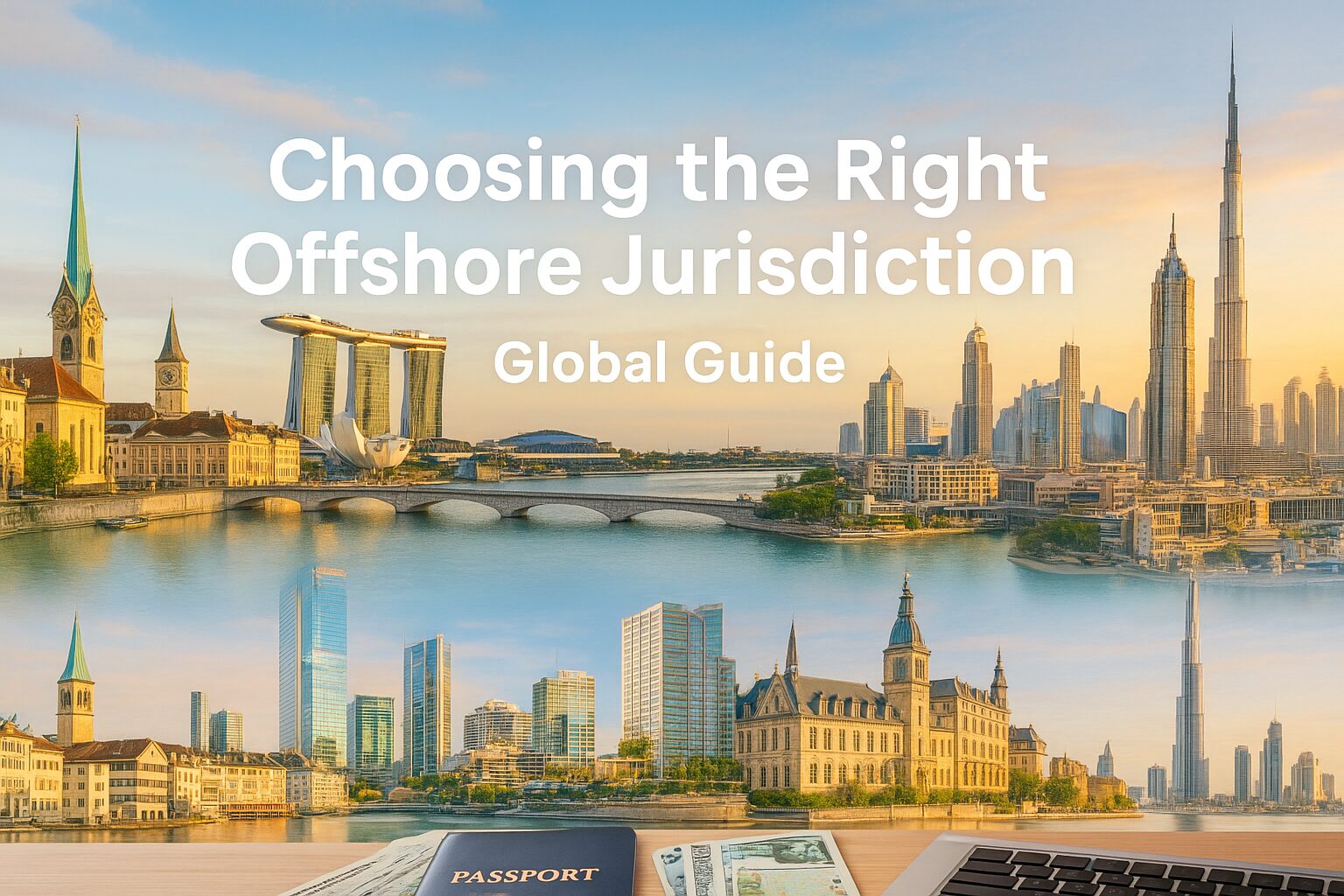Why Jurisdiction Matters More Than Ever
Opening an offshore account or incorporating a company abroad is only the first step. The jurisdiction you choose will determine not only your tax obligations but also your level of security, reputation, and access to global opportunities.
While all offshore centers promise advantages, not every jurisdiction is the same. Some offer credibility and world-class infrastructure; others provide flexibility and low-cost structures but face questions about transparency. Making the wrong choice can create more problems than it solves.
This guide compares five of the world’s most important offshore hubs — Switzerland, Singapore, Cayman Islands, Luxembourg, and Dubai — so you can identify which aligns with your goals.
Switzerland – Stability and Discretion
Strengths
- Globally recognized for financial stability and credibility.
- Banking secrecy traditions (though softened by international regulations) still attract wealth.
- Access to world-class private banking, asset management, and safe-haven investments.
- Strong currency (Swiss franc) provides additional protection.
Weaknesses
- High entry requirements; many private banks require deposits in the millions.
- Strict compliance standards; not ideal for those seeking anonymity.
- Expensive operating costs.
Best For
- High-net-worth individuals and family offices seeking prestige, discretion, and safety.
- Investors who value wealth preservation more than aggressive growth.
Singapore – The Asian Financial Powerhouse
Strengths
- Strategic location connecting Asia, Europe, and the U.S.
- Known for regulatory strength, digital infrastructure, and global connectivity.
- Excellent for entrepreneurs and digital nomads due to fintech-friendly policies.
- Multi-currency accounts widely available.
Weaknesses
- Not the cheapest option; maintaining accounts can be costly.
- Strict compliance checks; documentation requirements are high.
- Competition for access to exclusive private banking services.
Best For
- Entrepreneurs, start-ups, and digital businesses.
- Investors seeking Asia-Pacific exposure.
- Those who want a balance of stability and growth.
Cayman Islands – Flexibility and Fund Management Hub
Strengths
- No direct taxes (income, capital gains, inheritance, corporate).
- Leading jurisdiction for hedge funds and investment vehicles.
- Flexible regulations and business-friendly legal system.
- Popular with fund managers and global investors.
Weaknesses
- Less prestigious compared to Switzerland or Luxembourg.
- May attract regulatory scrutiny due to “tax haven” reputation.
- Limited for those seeking strong personal banking services.
Best For
- Fund managers, hedge funds, and global investment companies.
- Corporations seeking tax-efficient structures.
- Investors comfortable with offshore jurisdictions that prioritize flexibility.
Luxembourg – Europe’s Trusted Wealth Center
Strengths
- A global leader in cross-border investment funds.
- Strong reputation within the European Union.
- Politically stable, with robust legal protections.
- Excellent for private banking and corporate structuring.
Weaknesses
- More conservative in terms of product access compared to Singapore or Cayman.
- May involve higher administrative and reporting costs.
- Best suited for sophisticated investors rather than small entrepreneurs.
Best For
- European investors and families seeking secure wealth management.
- Corporations managing cross-border funds.
- Those who value EU-based credibility.
Dubai (UAE) – Tax-Free Lifestyle and Global Business Gateway
Strengths
- Zero personal income tax and corporate tax advantages in free zones.
- Excellent hub for entrepreneurs and global traders.
- Residency visas tied to company formation make relocation easy.
- Rapidly growing reputation as a global financial center.
Weaknesses
- Relatively new player compared to Switzerland or Luxembourg.
- Regulatory environment still evolving.
- May require physical presence or company setup to maintain banking privileges.
Best For
- Entrepreneurs seeking tax-free living.
- Digital nomads and global freelancers.
- Corporations expanding into the Middle East, Africa, or Asia.
How to Choose the Right Jurisdiction
Step 1: Define Your Goal
- Wealth Preservation: Switzerland, Luxembourg
- Business Expansion: Singapore, Dubai
- Fund Management: Cayman Islands
Step 2: Match Reputation With Need
- If credibility is important for investors, choose Switzerland or Luxembourg.
- If cost and flexibility matter more, Cayman or Dubai may be better.
Step 3: Consider Access and Compliance
- Are you ready to provide extensive documentation? (Switzerland, Singapore)
- Do you need minimal bureaucracy? (Cayman, Dubai)
Step 4: Diversify Jurisdictional Risk
- Don’t rely on just one country. Combining accounts (e.g., Switzerland for stability + Singapore for growth) provides balance.
Practical Checklist
- Decide whether your priority is tax optimization, security, or growth.
- Research minimum deposit requirements and compliance obligations.
- Consider physical presence rules (important in Dubai).
- Balance prestige (Switzerland, Luxembourg) with flexibility (Cayman, Dubai).
- Diversify by using two jurisdictions instead of one.
Conclusion: Jurisdiction Is the Foundation of Offshore Strategy
Choosing the right offshore jurisdiction is not about chasing the lowest taxes. It’s about finding the best fit for your wealth goals, lifestyle, and risk tolerance. Switzerland and Luxembourg offer prestige and stability, Singapore provides growth and innovation, Cayman Islands deliver flexibility, and Dubai gives entrepreneurs tax-free mobility.
The right choice depends on your personal and business needs — but choosing wisely ensures your offshore strategy is not only effective today, but resilient for decades to come.
📌 Next Article Preview
In the next part of this series, we will uncover:
“Corporate Offshore Structures – Holding Companies, Trusts, and Foundations Explained”
You’ll discover how global investors and entrepreneurs use holding companies, family trusts, and private foundations to protect assets, optimize taxes, and pass wealth across generations. This guide will reveal the structures the wealthy rely on — and show you how to adapt them to your own financial strategy.
